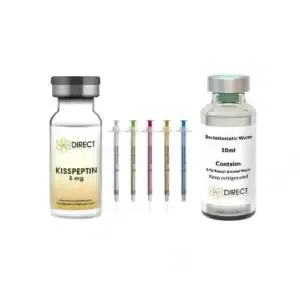Buy Kisspeptin Peptide Austria
Buy Kisspeptin, a naturally occurring protein that plays a crucial role in regulating the reproductive system, promoting hormonal balance and fertility.
Shop our Full Range of Kisspeptin Peptides
-
Sale!
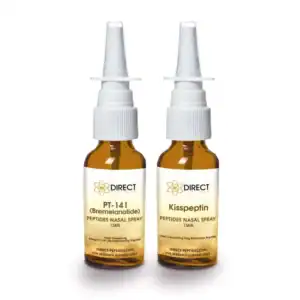
Kisspeptin PT-141 Nasal Stack
£51.65 – £94.30Price range: £51.65 through £94.30 This product has multiple variants. The options may be chosen on the product page -
Sale!
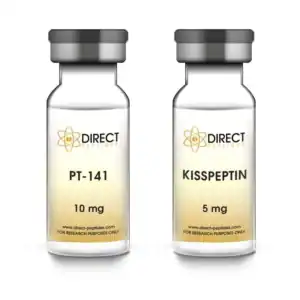
PT-141 Kisspeptin Peptide Stack
£37.25 – £46.23Price range: £37.25 through £46.23 This product has multiple variants. The options may be chosen on the product page -
Sale!

Kisspeptin Pre-Mixed Pen 5mg
£24.14 – £65.18Price range: £24.14 through £65.18 This product has multiple variants. The options may be chosen on the product page -
Sale!
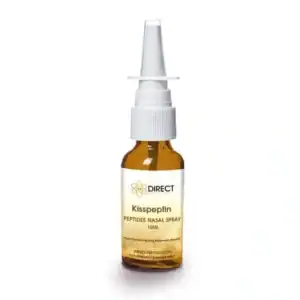
Kisspeptin Nasal Spray
£27.94 – £50.88Price range: £27.94 through £50.88 This product has multiple variants. The options may be chosen on the product page -
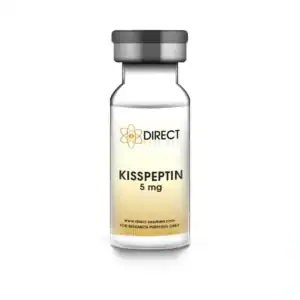
Kisspeptin Peptide Vial
£19.94 – £47.48Price range: £19.94 through £47.48 This product has multiple variants. The options may be chosen on the product page
What Is Kisspeptin?
Kisspeptin, a potent endogenous ligand, is a natural peptide, encoded by the KISS1 gene. It starts as a 145 amino acid polypeptide. This polypeptide is broken down into smaller peptides, including one with 54 amino acids, which is then processed into its active form, Kisspeptin-10.
Kisspeptin plays a key role in regulating the hypothalamic-pituitary-gonadal (HPG) axis. It triggers the release of gonadotropin-releasing hormone (GnRH), which stimulates the production of luteinizing hormone (LH) and follicle-stimulating hormone (FSH). These hormones are essential for ovulation, sperm production, and overall reproductive health.
Kisspeptin is also critical for starting puberty and may impact conditions like infertility. Its importance has made it a focus of clinical research, with ongoing studies exploring its role in treating reproductive disorders and its broader effects in neuroscience and endocrinology.
Kisspeptin Mechanism Of Action
Kisspeptin activates G-protein coupled receptors, specifically the KISS1R receptor (also called GPR54). When it binds to KISS1R, it triggers neurons in the hypothalamus to release pulses of gonadotropin-releasing hormone (GnRH). In turn, it stimulates the anterior pituitary gland to produce LH and FSH. Both of which are crucial for gamete development and sex hormone production.
Studies also show that it affects brain circuits linked to reproduction and behavior. This highlights its broader role in regulating the neuroendocrine system. Understanding these processes is important for developing treatments for conditions like hypogonadism, PCOS, and infertility.

Structure of Kisspeptin
Peptide Sequence: H-Tyr-Asn-Trp-Asn-Ser-Phe-Gly-Leu-Arg-Phe-NH2 Molecular Formula: C63H83N17O14 Molecular Weight: 1302.4 g/mol PubChem CID: 25240297What Are The Research Benefits of Kisspeptin
Regulation of Reproductive Hormones
It plays a central role in triggering the hypothalamic-pituitary-gonadal (HPG) axis by stimulating GnRH release. This, in turn, promotes the secretion of luteinising hormone (LH) and follicle-stimulating hormone (FSH), which are vital for gamete production and sex hormone synthesis. Austria Studies have demonstrated that mutations in the kisspeptin receptor (KISS1R) result in hypogonadotropic hypogonadism, highlighting its essential role in reproductive hormone regulation [1].
Potential as a Testosterone Booster
It is gaining attention for its role in increasing testosterone. It acts on the hypothalamus to release gonadotropin-releasing hormone (GnRH), which triggers luteinising hormone (LH) production to stimulate testosterone in the testes. This makes it a promising area of research for treating low testosterone conditions like hypogonadism and exploring its role in hormone regulation and reproductive health [2].
Improvement of Fertility Outcomes
Scientific research shows that kisspeptin-based treatments can aid individuals with reproductive challenges, such as infertility. Austria Studies have shown how peptide administration can effectively stimulate oocyte maturation during in vitro fertilisation (IVF) procedures, offering a safer alternative to traditional hormonal triggers [3].
Enhancement of Pubertal Development
It is a key regulator of pubertal onset. Studies show that a rise in kisspeptin levels precedes the activation of the HPG axis during puberty. This increase is closely associated with changes in plasma concentrations of growth hormone (GH), which also play an important role in pubertal progression. The interplay between this peptide and GH highlights its importance as both a critical marker and a therapeutic target for conditions causing delayed or precocious puberty [4].
Impact on Behaviour and Mood
Evidence suggests that it not only regulates reproduction but also influences emotional and sexual behaviour. Austria Studies have demonstrated that administration of the peptide enhances brain activity in regions associated with reproductive and emotional processing, providing potential pathways for treating mood disorders linked to hormonal imbalances [5].
Potential for Treating Polycystic Ovary Syndrome (PCOS)
Dysregulation of kisspeptin is associated with PCOS, a common endocrine disorder in women. It was found to alter kisspeptin signalling in PCOS patients, indicating its potential role in therapeutic interventions to restore hormonal balance and ovulatory function [6].
Role in Neuroendocrine Research
It serves as a vital molecule for understanding the connections between the brain and endocrine system, aiding in the study of neuroendocrine disorders. Its ability to influence GnRH neurons makes it a focal point for developing novel treatments for various reproductive and hormonal conditions [7].
Cardiovascular Health
Emerging research suggests that it may also play a role in the cardiovascular system. Studies indicate that it could influence heart function and vascular health by impacting blood pressure regulation and promoting healthy blood vessel function. Understanding these interactions could open new pathways for treating cardiovascular diseases [8].
Kidney Function and Health
Recent Austria research shows that it may play a role in kidney health by regulating processes like filtration and electrolyte balance. It could also influence angiogenesis in the kidneys, vital for healthy blood flow and tissue repair. Further studies are needed to explore its potential in managing kidney conditions like chronic kidney disease and hypertension. Understanding kisspeptin’s role in renal health could lead to new treatments for these issues.
Energy Balance and Metabolism
Emerging evidence suggests that it might influence energy balance and metabolic regulation. It has been linked to the control of appetite and body weight, potentially by interacting with pathways involving other metabolic hormones such as leptin and insulin. This indicates that it may play a role in ensuring energy homeostasis, which is crucial for overall health. Investigating this relationship further could provide insights into managing obesity and metabolic disorders [10].
Appetite Regulation
Research suggests it may play a role in appetite regulation by acting as a metabolic regulator. One study found that it increased neuropeptide Y (NPY) gene expression, which is linked to hunger, while reducing brain-derived neurotrophic factor (BDNF) at higher doses. It also decreased serotonin (5-HT) and dopamine (DA) levels, suggesting an orexigenic (appetite-stimulating) effect. These findings also highlight the peptide’s potential to connect energy balance with reproductive health [11].
Implications in Cancer Research
Kisspeptin is known as a human metastasis suppressor gene and has been widely studied for its ability to inhibit cancer metastasis, especially in breast and prostate cancers. It plays a crucial role in suppressing tumor growth and stopping the spread of cancerous cells by regulating key pathways involved in cellular migration, invasion, and apoptosis. Specific residues within its structure are thought to be vital to these functions, making kisspeptin a promising focus for developing innovative anti-cancer therapies [12]
Buy Kisspeptin Pepide Austria for research use online today!
Buy Kisspeptin PT-141 Peptide Nasal Stack
Buy Kisspeptin PT-141 nasal stack Austria, a combination of Kisspeptin and PT-141, designed for convenient intranasal administration. PT-141, also known as Bremelanotide, is a peptide known for its effects on enhancing libido and sexual arousal by acting on melanocortin receptors in the brain.
When combined, the stack may provide synergistic benefits for improving sexual function and reproductive health. This nasal delivery method ensures efficient absorption and ease of use, making it a popular choice for non-invasive options for hormonal and sexual wellness.
Buy Kisspeptin Peptide Vial
Buy Kisspeptin peptide vial Austria, available in 10mg, it contains a purified form of the Kisspeptin protein, provided as a lyophilized powder for research or potential therapeutic use. The freeze-drying process ensures stability and longevity during storage. Before use, the powder needs to be reconstituted with bacteriostatic water for precise preparation.
The peptides are used in studies on hormonal regulation, reproductive health, and fertility due to their role in stimulating gonadotropin-releasing hormone (GnRH). The vial format ensures accurate dosing and sterility, making it a reliable choice for laboratory and clinical research.
Frequently Asked Questions (FAQs) about Kisspeptin
Does kisspeptin really work?
Research shows it controls hormone secretion to stimulate luteinising hormone (LH) and follicle-stimulating hormone (FSH), which are crucial for ovulation and sperm production. This suggests it could aid fertility treatments, but larger studies are needed to confirm its effectiveness. While promising, kisspeptin is not yet a widely used treatment.
Is kisspeptin better than hCG?
Human chorionic gonadotropin (hCG) has long been used in fertility treatments to stimulate ovulation and support early pregnancy by mimicking luteinising hormone (LH). It offers a more natural approach, acting on the hypothalamus to trigger gonadotropin-releasing hormone (GnRH), which stimulates LH and FSH production.
Austria Studies suggest it may better regulate reproductive hormones and lower the risk of ovarian hyperstimulation syndrome (OHSS), a common side effect of hCG treatments. While early evidence highlights kisspeptin’s potential, further research is needed to fully understand its advantages and limitations in clinical use.
What are the side effects associated with kisspeptin?
Austria Research is still in early stages, so data on side effects is limited. Some studies report mild symptoms like nausea, headaches, and discomfort. Since it affects reproductive hormones, it may cause hormonal fluctuations, though these are not fully understood. Further studies are needed to assess its safety and long-term effects.
Is kisspeptin legal?
Yes, it is legal; however, its use is primarily confined to research and clinical settings. It is not currently approved for widespread medical treatments or over-the-counter use. Austria Research into it’s potential therapeutic applications, particularly in addressing infertility and other reproductive issues, is ongoing.
Regulatory approvals may vary between countries, including oversight by organisations such as the FDA. Any use outside established guidelines should adhere to ethical and legal standards.
Buy Kisspeptin Pre-Mixed Peptide 5 mg Pen Austria from Direct Peptides for in vitro research use. The Pre Mixed Cartridge and Kit includes a premixed cartridge, peptide cartridge pen, carry case, and 3 needle tips.
Single Mixed Cartridges (1, 2, or 3) come with corresponding premixed cartridges and 3 needle tips but do not include a kit. Save 10% when purchasing 3 cartridges.
Summary of Research Applications
- Regulates reproductive hormones
- Enhances fertility and ovulation
- Supports puberty development
- Maintains hormonal balance
- Improves reproductive health
Buy Kisspeptin Nasal Spray Austria, 99% purity for research.
Kisspeptin Peptide Quality Assured
Direct Peptides offers 99% pure Kisspeptin peptides for research, manufactured to strict quality standards.
These peptides aid studies on reproductive hormones and potential therapies for infertility and sexual dysfunction. Buy Kisspeptin peptides today.
References For Further Reading
[1] Waljit S Dhillo, Owais B Chaudhri, Emily L Thompson, Kevin G Murphy, et al (2007) Kisspeptin-54 stimulates gonadotropin release most potently during the preovulatory phase of the menstrual cycle in women – J Clin Endocrinol Metab, 2007 Oct, Volume 92 (Issue 10), Pages 3958-66.
[2] J T George, J D Veldhuis, A K Roseweir, C L Newton, et al (2011) Kisspeptin-10 is a potent stimulator of LH and increases pulse frequency in men – Journal of Clinical Endocrinology & Metabolism, 2011 Aug, Volume 96 (Issue 8), Pages E1228-36.
[3] Lixian Qin, Chantacha Sitticharoon, Somsin Petyim, Issarawan Keadkraichaiwat, et al (2020) Roles of kisspeptin in IVF/ICSI-treated infertile women and in human granulosa cells – Experimental Biology & Medicine (Maywood), 2020 Dec 16, Volume 246 (Issue 8), Pages 996–1010.
[4] Yee-Ming Chan, Margaret F Lippincott, Priscila Sales Barroso, Cielo Alleyn, et al (2020) Using Kisspeptin to Predict Pubertal Outcomes for Youth With Pubertal Delay – Journal of Clinical Endocrinology & Metabolism, 2020 Aug 1, Volume 105 (Issue 8), Pages e2717-e2725.
[5] Ewa Gibula-Tarlowska and Jolanta H Kotlinska (2020) Kissorphin improves spatial memory and cognitive flexibility impairment induced by ethanol treatment in the Barnes maze task in rats – Behavioural Pharmacology, 2020 Apr, Volume 31 (Issues 2&3), Pages 272-282.
[6] Ting Zhao, Xiao Xiao, Lingchuan Li, Xinghua Tao, et al (2023) Role of kisspeptin in polycystic ovarian syndrome: A metabolomics study – Clinical Endocrinology, Volume 99, Issue 3, September 2023, Pages 315-325.
[7] Qinying Xie, Yafei Kang, Chenlu Zhang, Ye Xie, et al (2022) The Role of Kisspeptin in the Control of the Hypothalamic-Pituitary-Gonadal Axis and Reproduction – Frontiers in Endocrinology (Lausanne), 2022 Jun 28, Volume 13, Pages 925206.
[8] E J Mead, J J Maguire, R E Kuc, and A P Davenport (2007) Kisspeptins: a multifunctional peptide system with a role in reproduction, cancer and the cardiovascular system – British Journal of Pharmacology, 2007 May 21, Volume 151 (Issue 8), Pages 1143–1153.
[9] Moshmi Bhattacharya and Andy V Babwah (2015) Kisspeptin: beyond the brain – Endocrinology, 2015 Apr, Volume 156 (Issue 4), Pages 1218-27.
[10] Campbell J L Harter, Georgia S Kavanagh, Jeremy T Smith (2018) The role of kisspeptin neurons in reproduction and metabolism – Journal of Endocrinology, 2018 Sep, Volume 238 (Issue 3), Pages R173-R183.
[11] Orlando G, Leone S, Ferrante C, Chiavaroli A, Mollica A, Stefanucci A, Macedonio G, Dimmito M P, Leporini L, Menghini L, Brunetti L, Recinella L (2018) Effects of Kisspeptin-10 on Hypothalamic Neuropeptides and Neurotransmitters Involved in Appetite Control – Molecules, 2018 Nov 24, Volume 23 (Issue 12), Page 3071.
[12] Angeliki Makri, Nikolaos Pissimissis, Peter Lembessis, et al (2008) The kisspeptin (KiSS-1)/GPR54 system in cancer biology – Cancer Treatment Reviews
Volume 34, Issue 8, December 2008, Pages 682-692.
Why Choose Direct Peptides Austria?
Buy Kisspeptin Austria today from Direct Peptides, your trusted source for quality peptides. We offer a range of options, including 5 mg and 10 mg vials, peptide stacks, nasal sprays in 15 ml and 30 ml bottles, and pre-mixed peptide pens. Whatever your research needs, we provide the formulations to support your projects.
ALL CONTENT AND PRODUCT INFORMATION AVAILABLE ON THIS WEBSITE IS FOR EDUCATIONAL PURPOSES ONLY.
DISCLAIMER: These products are intended solely as a research chemical only. This classification allows for their use only for research development and laboratory studies. The information available on our Austria Direct Peptides website: https://direct-peptides.com is provided for educational purposes only. These products are not for human or animal use or consumption in any manner. Handling of these products should be limited to suitably qualified professionals. They are not to be classified as a drug, food, cosmetic, or medicinal product and must not be mislabelled or used as such.
Related Posts
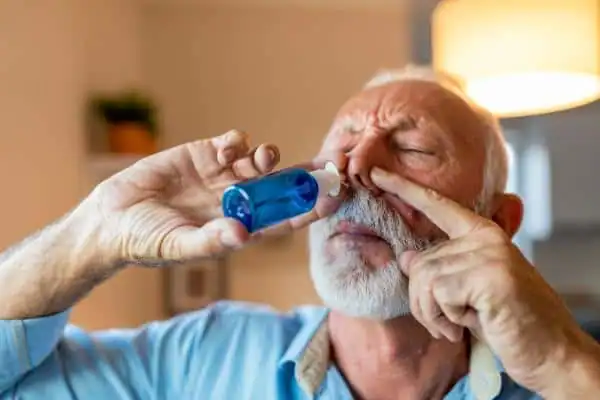
Exploring Intranasal Peptides: Efficacy and Applications
This blog explores the use of intranasal peptides in biotechnology, focusing on their non-invasive delivery for higher bioavailability and faster access to the brain and bloodstream. It covers mechanisms like mucosal absorption and olfactory pathways, along with applications in cognitive enhancement, neurodegenerative diseases, sexual dysfunction, and mental health.

Peptide Stack PT-141 And Kisspeptin To Help With Sexual Dysfunction
This blog explores PT-141 and Kisspeptin as new peptides for treating sexual dysfunction. PT-141 boosts arousal by targeting the brain, while Kisspeptin regulates sex hormones, addressing both neurological and hormonal systems. Together, they show promise in peptide therapy, though more research is needed to confirm their effectiveness and safety.

HCG In Fertility Treatments For Women
This blog reviews the role of Human Chorionic Gonadotropin (HCG) in fertility treatments for women, focusing on its functions in ovulation, the luteal phase, and embryo implantation. It also covers its use in assisted reproduction, pregnancy monitoring, and explores alternatives like Kisspeptin, Gonadorelin and HMG.

